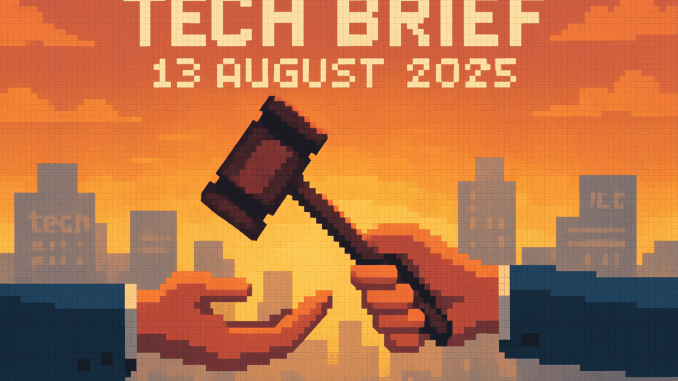
“‘Trust but verify’ sounds overcautious, but it’s become good editorial policy, and today it fits. Tech Brief 13 August 2025 brings news of a GitHub shake-up, another round in the mobile device arms race, and a dramatic change at Tesla. Not all innovations stick, and not every leader stays put. Missed yesterday’s Tech Brief? Catch up here before diving in.
GitHub CEO Thomas Dohmke Resigns To Found New Startup
“Stepping down doesn’t mean stepping away,” Thomas Dohmke reportedly told colleagues this week, weeks after resigning as GitHub CEO. Dohmke has always signalled his fondness for the building phase, and now he’s chosen to step out of Microsoft’s shadow to found a new startup. The platform’s interim leadership lies with Julia Liuson, while the search for a permanent successor begins.
For developers whose careers arc from bulletin boards to cloud repos, this headline feels significant. GitHub has long stood as the world’s collaborative coding desk, and many of us recall the leap from email patch files to web-based pull requests. The news has the potential to affect millions, both open source maintainers and those simply dependent on GitHub uptime. Leadership change signals a new era for a service that, a decade back, felt almost heretical to those raised hand-merging code on early systems.
What future lies for the place where C code and assembly live beside JavaScript and Markdown? Watch this space. It always feels like a turning point when the stewards move on.
Google Confirms Pixel 10 Event With Fold Release
Numbers tell the story: four new Pixel 10 models launching on 20 August, including a “Pro Fold” tipped for superior waterproofing. Google has declared open season ahead of Apple’s autumn lineup. This year’s innovation is “proper” water resistance, a claim meant to trump Samsung’s Galaxy Z Fold7 and sap a little wind from Apple’s sails. The event will get broadcast globally, continuing the tradition of tech events doubling as theatrical showcases.
It’s difficult not to recall the battles that raged around desktop browsers in the nineties. Companies sparred over JPEG support and which homepage loaded fastest. Now the weapons are folding hinges and waterproof ratings. For anyone still loyal to Palm or Psion, these modern spec wars seem oddly familiar.
Do these launches matter? Yes, if you build for Android, or if your device allegiance gets shaped by summer announcements. Otherwise, maybe less. Still, anyone picking through gadget history will sense an echo of old rivalries here; nothing’s changed except the screen shapes.
Tesla Pulls The Plug On Dojo Supercomputer As Team Departs
Tesla has quietly shelved its ambitious Dojo supercomputer. The entire development team has packed up, following a project wind-down that surprised nobody in hardware circles. Originally billed as the AI backbone for autonomous driving, Dojo has finished as a costly experiment in what can go awry when vision outpaces solder and silicon.
The broader AI community has reacted with a mix of grim satisfaction and muted sympathy. A great idea, but execution often stumbles, especially when hardware promises outstrip what’s practical or even possible in-house. There are shades of dot-com failures here. There’s always the dream, and there’s always the awkward dismount.
A final aside: This sort of U-turn on big hardware ambition has played out in British computing plenty, a nod to those who recall grand launches that fizzled fast. Sometimes, the most reliable tech is the one left running under your desk, quietly doing its job.
From the Wayback Machine
On This Day: 1889 – US Patent granted for the coin-operated payphone. William Gray’s invention made public telephony a reality, shifting calling from cash-handling clerks to mechanical coins. His design used a system where different coins dropped onto tone-signalling gongs, giving operators audio confirmation before a call began. The system rolled out first in a Hartford bank and started the age of private, stand-up booth telephony, giving ordinary people access to phone lines outside workplaces or homes. A century later, the legacy persists in the tap and go payment systems and the nostalgia many feel for their local red phone box.
What This Means
Some stories in Tech Brief 13 August 2025 evoke the brittle optimism of past eras, when hardware giants and software stewards lived and died by big bets. We see cycles, failures, and new faces stepping up, the old web culture reinvented again for a different audience.
Stay curious, and if your code’s backed up on a dusty DAT drive somewhere, maybe check it tonight. Street wisdom is always in short supply.
Missed yesterday’s Tech Brief? Catch up here

Leave a Reply